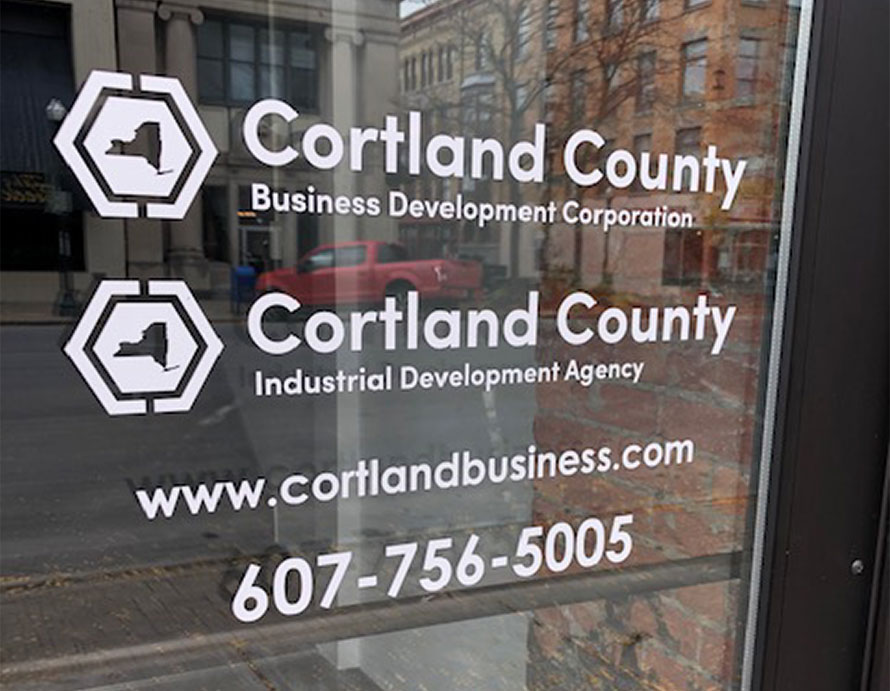About the IDA

What is an IDA?
The Cortland County Industrial Development Agency is a public benefit corporation of the State of New York, created by the Cortland County Legislature pursuant to Chapter 77 of the 1974 Laws of New York, effective March 19, 1974. As a public authority, the Cortland County IDA has the powers and duties conferred by Article 18-A of the New York General Municipal Law.
How is the IDA funded?
The IDA receives no county funding and has no paid staff. A modest annual operating budget is supported entirely by project fees from incentive recipients for services rendered and future administrative responsibilities. Fees generated by projects are also redirected back into other county development projects, such as infrastructure for road, water, or sewer improvements to serve new sites.
How is the IDA managed and governed?
A separate not-for-profit economic development agency, the Cortland County Business Development Corporation (BDC) provides the staff to manage IDA operations. The IDA retains legal counsel to coordinate and deliver legal services including, but not limited to, all aspects of delivering incentives to local development projects. Legal counsel also assists with an annual performance audit of IDA projects, provides staff with important guidance on compliance with a host of state regulatory requirements, and represents the agency as required in discussions and interactions with local municipal leaders.
In addition, the IDA secures an independent auditor to conduct an annual compliance audit with respect to the various state filing and regulatory requirements of the agency.
The IDA is governed by a seven-member board that is appointed by the Cortland County Legislature. The IDA board members also sit on the BDC board along with six at-large BDC directors elected to three-year terms by the IDA.

FAQ
What laws apply to IDAs?
Because the IDA is a public authority, it is subject to oversight by the New York State Authority Budget office with respect to accountability and transparency.
The ABO carries out its mission by:
- Collecting, analyzing and disseminating to the public information on the finances and operations of state and local public authorities;
- Conducting reviews to assess the operating and governance practices of public authorities and compliance with state laws;
- Promoting good governance principles through training and technical assistance, and the issuance of policy guidance and recommended best practices; and
- Investigating complaints made against public authorities for non-compliance or inappropriate conduct.
The IDA is also subject to numerous other state laws including but not limited to:
- Open Meetings Law: The IDA must give notice to the public and news media of all meetings. All meetings are open to the public. The agency votes in open meetings and can only go into executive session to discuss certain limited items
- State Environmental Quality Review: The IDA must comply with Article 8 of the New York Environmental Conservation Law and the implementing regulations (the “SEQR Act”)
- Freedom of Information Law: The IDA must comply with Article 6 of the New York Public Officers Law (the “Freedom of Information Law” or “FOIL”) which requires that with certain limited exceptions, the IDA must provide public access to records of the agency.
- Personal Privacy Law: The IDA must comply with Article 6-A of the New York Public Officers Law (the “Personal Privacy Protection Law”).
- Conflict of Interest Law: The IDA must comply with Article 18 of the New York General Municipal Law that defines conflicts of interest.
- Ethics Law: The IDA is bound by Section 810 (3) of the New York General Municipal Law, in that members, officers are deemed officers and employees of Cortland County for the purposes of the “State Ethics Law,” and they may be subject to annual financial disclosure.
What geographic areas may be considered for IDA benefits?
What benefits can the IDA provide, and to whom?
Criteria for IDA projects are outlined through Article 18-A of New York General Municipal Law. Under the General Act, the IDA can undertake the following types of projects: manufacturing, warehousing, research, commercial, industrial, industrial pollution control facility, recreation facility, horse racing facility, educational or cultural facility, continuing care retirement community, railroad facility, renewable energy, or other projects that create public benefit.
The IDA evaluates projects on a case-by-case basis to assure that projects result in direct new investment, may stimulate additional investment beyond the initial project, and increase employment.
Potential IDA benefits may include:
- Interest exemption on certain federal and state debt, providing the project meets the requirements of the Internal Revenue Code. These exemptions of interest allow borrowing at lower interest rates;
- Exemption from the New York State Mortgage Recording Tax;
- Exemption from New York State and local sales tax for purchases of equipment and building supplies during the project period;
- Abatement of real property taxes on new construction or purchase of a facility via a sale-leaseback or lease-leaseback arrangement. For new construction or renovations warranting an increase in existing assessments, the IDA’s uniform tax exemption policy applies to the project’s total assessed value, provided the IDA approves the project as suitable. The real property tax reductions under the PILOT schedule are effective as the first assessment roll prepared by the taxing authorities after the IDA has acquired an interest in the real property.
What is the IDA’s Standard Pilot?
The standard Cortland County IDA PILOT schedule is as follows:
| Year of Exemption | Amount of Reduction |
| 1 – 3 | 100% |
| 4 – 5 | 75% |
| 6 – 8 | 50% |
| 9-10 | 25% |
| 11 and thereafter | 0% |
The foregoing schedule provides for an approximately 65% reduction in real property taxes over a ten-year period. Terms and conditions of the PILOT are outlined in an agreement between the company and the IDA and subject to the tax guidelines of Cortland County.
Does the IDA ever deviate from its standard PILOT?
The decision to deviate from a standard PILOT is at the discretion of the IDA board. Usually, a deviation occurs only as a condition of project financing, or in association with some other state program, or if a project is unusual in nature and requires special considerations related to its successful operations. If the IDA adopts a deviation, it must be set forth in a resolution adopted by the agency, with proper written notice and a public hearing. The IDA encourages local taxing authorities to participate in the public hearing and public comment period.
How does the IDA track performance of PILOTs?
Throughout the year, IDA staff may also make site visits, request additional financial information if required, or monitor SEC filings of public companies, to determine if there are potential problems. If there are apparent inconsistencies with affidavits filed with the IDA by the company receiving benefits, these are reported to IDA members.
The IDA confers frequently with the Office of Real Property Tax, the County Treasurer’s Office, and local taxing authorities to monitor that PILOT payments are being made under the terms of the PILOT agreements. PILOTs are billed by the taxing authorities.
